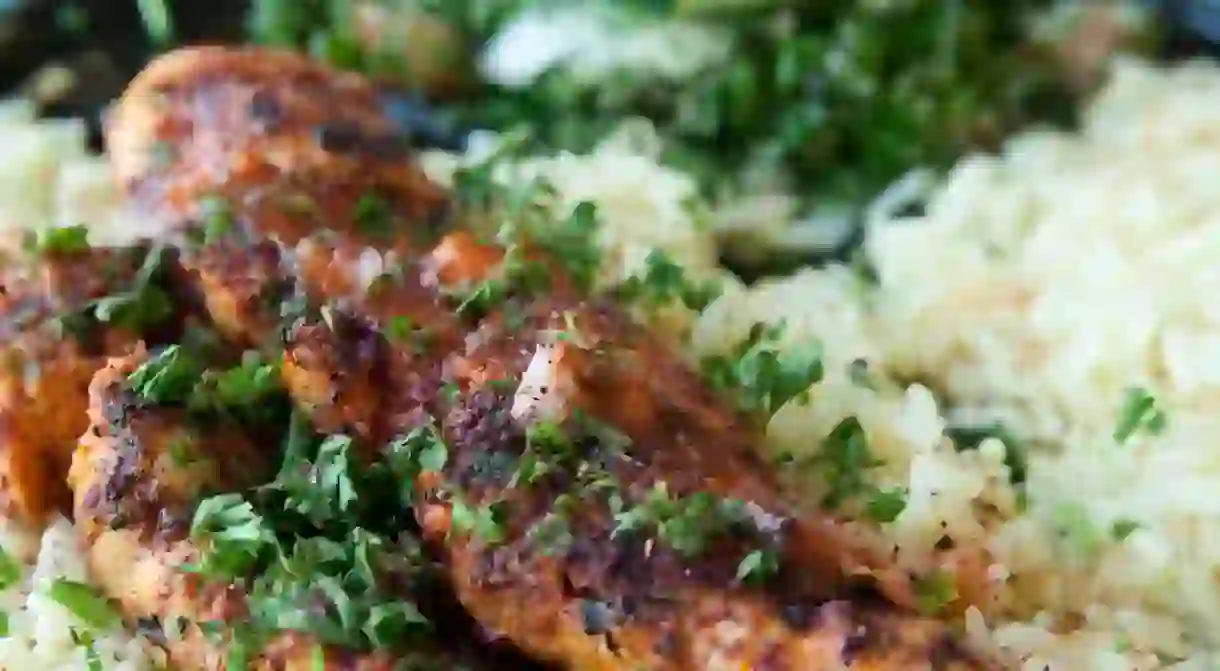10 Tips for Eating Healthy at an Iranian Restaurant

Nothing brings people together quite like food, and gathering around the table is a favorite pastime of Iranians. If you’ve had the pleasure of trying Persian cuisine, you know that the portions are huge, and Iranians aren’t satisfied unless you eat and eat and eat. But with all this eating, you can choose healthier options by following these tips.
Try Fish Kabob or Boneless Chicken
The national dish of Iran is arguably kabob, and with so many kabob joints, it’s easy to devour juicy lamb and saffron chicken kabobs daily. Restaurants always serve chicken with and without the bone, so for a traditional kabob, opt for boneless chicken, which has skinless white meat. In case you’ve reached your meat threshold or are just looking for something lighter, try a fish kabob instead. Usually a char-grilled white fish, it’s served with lemon or nâranj, a type of sour orange, when they are in season.

Order Salad Shirazi
Creamy dressings definitely make for a good salad, but that can leave you with a pang of guilt. The traditional Iranian salad, salad shirazi, is a super simple, three-ingredient side with diced tomato, cucumber, and onion (which are, coincidentally, the same colors as the Iranian flag) topped with dried mint and lemon juice or âb ghooreh, verjuice. Not only is it delicious, but you’ll realize that all the dressing you need is a guilt-free touch of acidity.

Load up on Appetizers
When you’re hungry, starters are often more exciting than the main dish. In Iranian restaurants, you can order various starters and dips, many of which originate from Mazandaran in the north. Zeytun parvardeh, olives dressed in pomegranate paste, crushed walnuts, and garlic shouldn’t be missed. Various yogurts like mâst-o khiâr, yogurt with cucumbers, and mâst-e museer, yogurt with shallots, are popular dips to have with flatbread. Veggie dishes like mirzâ ghâsemi, smoked eggplant mashed with tomatoes and eggs, and kashk-e bâdemjân, eggplant with whey, are also crowd favorites.

Cut the Butter
Fluffy Iranian rice is always served with a slab of butter on top. It’s tempting to mix it right in, but before it melts, take it off as a healthier choice (or maybe just use less if you must!)
Share
Portions are quite generous, so you might want to consider sharing. One plate of rice can easily be split between two or three people.
Ask for Veggie Kabobs
These can be a great option at jigaraki, small restaurants that specialize in liver, heart, and kidney kabobs. Just ask for a few veggie skewers, and you’ll be served with fire-roasted mushrooms, tomatoes, and peppers. You’ll also get them much quicker!

Choose Either Bread or Rice
Bread is served with starters and rice as part of the main dish, so if that’s carb overload, just choose one. Sometimes bread with kabob and fresh herbs hits the spot more than the buttery rice.
Skip the Soft Drinks
This may be a common sense tip, but in Iranian restaurants, replace soft drinks with doogh. Carbonated or flat, this salty, refreshing yogurt and dried mint beverage is the traditional drink to pair with your kabob, so you’ll be eating like a real local.
Finish with Some Fruit
Even though Iranians have a major sweet tooth, dessert is not a feature item on restaurant menus in Iran. Instead, at home, people have fresh fruit or if they are out, they head to ice cream shops, where it’s still possible to be good by ordering freshly squeezed juices.

Take Your Tea with Dried Fruit
You’ll be drinking more tea in Iran than you ever imagined, which can result in a major excess intake of sugar. But dried fruits such as dates, raisins, or mulberries act as natural sweeteners to curb that sugar rush, and are commonly served with tea.














